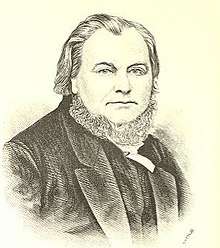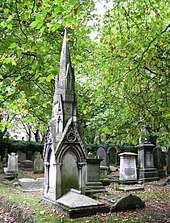Charles Vince (Baptist)
Charles Vince (1823–1874) was a noted and popular Baptist minister in Birmingham, England, at the Graham Street chapel from 1852 to 1874.[1] He was one of the religious leaders developing Birmingham's Civic Gospel, with his predecessor at the chapel George Dawson, and Henry William Crosskey.[2]

Life
Vince was born in Farnham, Surrey, into a Congregationalist background: his father was a carpenter and builder. He attended a local school, run by a nephew of William Cobbett, became an apprentice to Mason & Jackson, the firm for which his father worked, and joined the local Mechanics' Institute. After a Baptist conversion, he entered Stepney College in 1848. He was then assigned to the Mount Zion Chapel, in Graham Street, Birmingham.[3][4][5] He has been described as a "charismatic preacher".[6]
As a figure of the Birmingham "civic renaissance" (or "civic gospel"), a movement promoted by Dawson's supporters, Vince spoke for causes including the Reform League, the National Education League, and the Liberal Association. He was also personally popular as a minister.[7] He defended the radicalism of George Edmonds in an 1868 funeral sermon for him.[8]

Vince was an influential participant in Birmingham's social institutions, and a member of Birmingham's first school board. He died on 22 October 1874, at age 51, and was buried at Key Hill Cemetery, Hockley.[3][9]
Works
- Lessons for Christian labourers from the lives of the Jesuits (1861)
- The Child's Book of Praise (1863)
- Lights and Shadows in the Life of King David (1870)
- The Unchanging Saviour, and other sermons (1875)
- Christian Hymns for Public Worship (1876), with Henry Platten[10]
Family
Vince left a widow and seven children.[11] They included Charles Anthony Vince (born 1855), an academic, head of Mill Hill School, Liberal Unionist and local historian of Birmingham;[12] and James Herbert Vince.[13] The fourth son, W. B. Vince, was a solicitor and worked for the Birmingham Post before dying young.[14]
Notes
- Betteridge, Alan (2010-08-01). Deep Roots, Living Branches: A History of Baptists in the English Western Midlands. Troubador Publishing Ltd. p. 164. ISBN 9781848762770. Retrieved 7 March 2018.
- Parsons, Gerald (1988). Religion in Victorian Britain. Manchester University Press. p. 93. ISBN 9780719025112. Retrieved 7 March 2018.
- Cathcart, William (2001). The Baptist Encyclopedia. 2. The Baptist Standard Bearer, Inc. pp. 1194–5. ISBN 9781579789114. Retrieved 7 March 2018.
- Wesleyan-Methodist Magazine: Being a Continuation of the Arminian Or Methodist Magazine First Publ. by John Wesley. 1884. p. 742.
- Edwards, Eliezer (1877). Personal Recollections of Birmingham and Birmingham Men: Reprinted from the "Birmingham Daily Mail," with Revisions, Corrections, and Additions. Midland Educational Trading Company. p. 160. Retrieved 7 March 2018.
- Williams, J. B. (2009). Worsted to Westminster: The Extraordinary Life of the Rev Dr Charles Leach MP. Darcy Press. p. 65. ISBN 9780956252302. Retrieved 7 March 2018.
- Briggs, Asa (1993-03-24). Victorian Cities. University of California Press. p. 198. ISBN 9780520079229. Retrieved 7 March 2018.
- Thomas, Susan. "Edmonds, George". Oxford Dictionary of National Biography (online ed.). Oxford University Press. doi:10.1093/ref:odnb/74226. (Subscription or UK public library membership required.)
- Betteridge, Alan (2010-08-01). Deep Roots, Living Branches: A History of Baptists in the English Western Midlands. Troubador Publishing Ltd. pp. 303–. ISBN 9781848762770. Retrieved 7 March 2018.
- Vince, Charles (1876). Christian Hymns for Public worship, selected and arranged by C. Vince [and H. Platten]. Retrieved 7 March 2018.
- "The Gospel Magazine" (PDF). March 1875. p. 3. Retrieved 7 March 2018.
- "Vince, Charles Anthony (VN874CA)". A Cambridge Alumni Database. University of Cambridge.
- "Vince, James Herbert (VN883JH)". A Cambridge Alumni Database. University of Cambridge.
- Whates, Harold Richard Grant (1957). The Birmingham Post, 1857–1957: A Centenary Retrospect. Birmingham Post & Mail. p. 158.